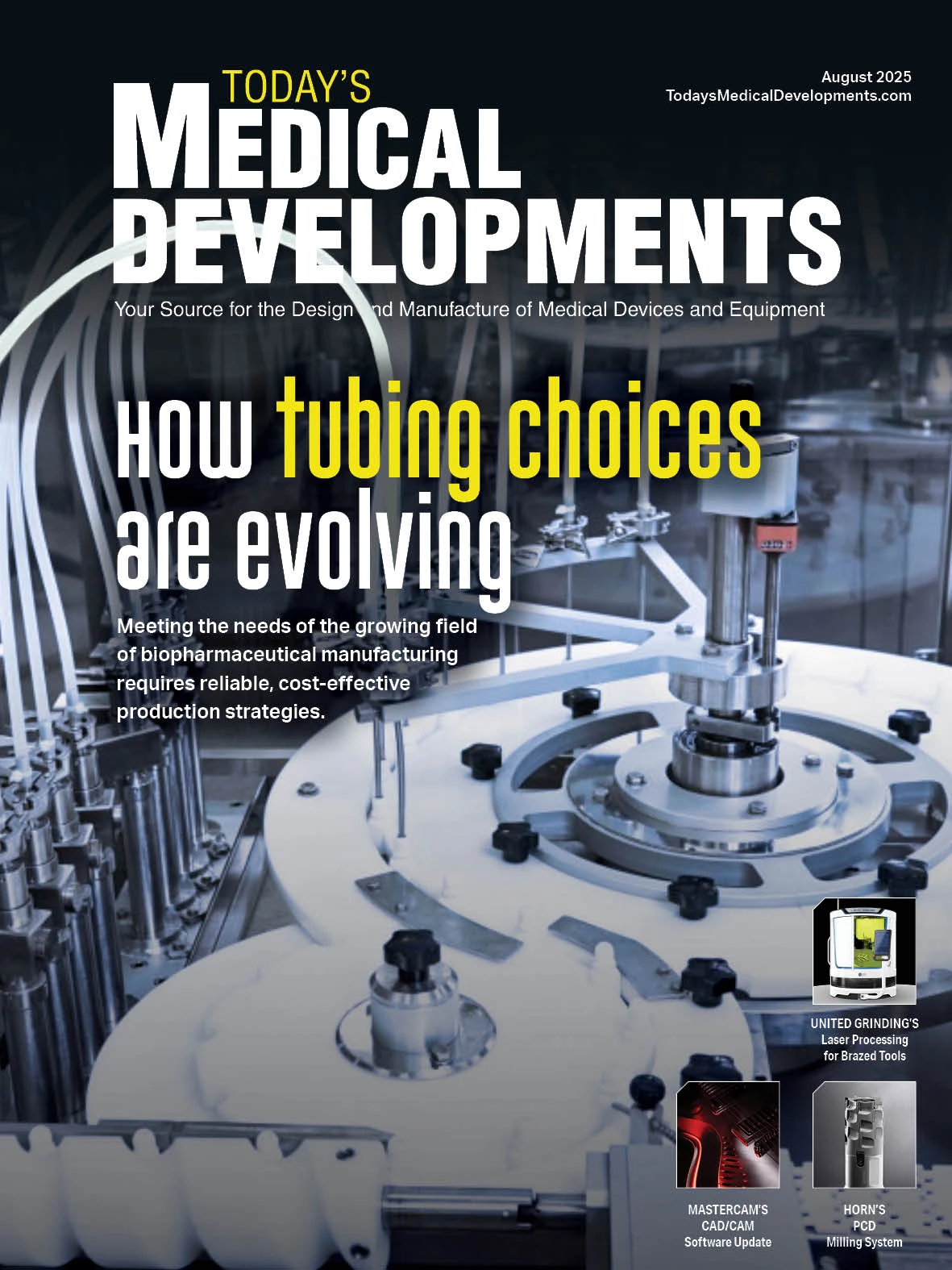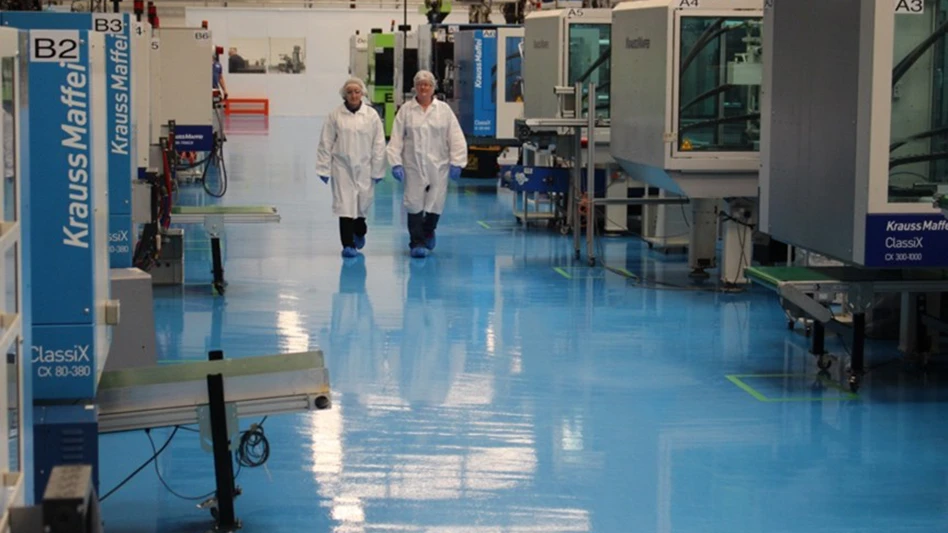
Editor's Note: This article originally appeared in the August 2025 print edition of Today's Medical Developments under the headline “Resilient supply chains start with adaptable, full-service suppliers”.
Manufacturing supply chains are experiencing significant uncertainty and disruptions from geopolitics, economic instability, cyberthreats – even extreme weather. Medical device manufacturers also must contend with ever-stricter regulations governing materials, technologies, and processes, as well as competitive pressure to bring novel products to market as quickly as possible. The more complex and geographically dispersed a supply chain becomes, the greater the likelihood of interruptions, spot shortages, quality impacts, and cost increases that can affect a device’s ultimate success.
Device makers are exploring different strategies to cope with today’s supply chain challenges. They include reshoring or near-shoring of production; investing in digital technologies such as predictive analytics for visibility, monitoring, and risk mitigation; using stocking agreements in local warehouses to improve lead times and surety of supply; and collaborating with suppliers to optimize device design and materials.
One way to reduce supply chain complexity is to choose a resin compounder offering a full range of products, services, and expertise, minimizing the need to coordinate with multiple providers. Relying on a trusted compounder with flexibility in material sourcing as well as customization capabilities relieves device manufacturers of the need to locate alternative materials in the event of a shortage or disruption. A full-service manufacturer can also qualify new materials to help a customer meet changing compliance or performance requirements, as well as formulate resins optimized for different molding methods or secondary operations such as laser welding.
Customer-driven approach
Some polymer manufacturers are only equipped to fill orders for standard resins and compounds, while others are vertically integrated. Device makers can benefit from collaborating with an agile, full-service compounder who adds value by providing a wide range of materials, services, and industry expertise.
One key difference between these two types of manufacturers is their focus. A customer-driven compounder will often take additional steps to identify the resin with the best combination of properties, performance, and processing for a given application – and further customize its formulation in-house to meet every requirement. This approach puts customers’ needs first.
Access to raw polymer materials from multiple suppliers and control over production can put a compounder in a favorable position in the event of a supply chain disruption, as seen in this example:
In 2021, a severe winter storm on the U.S. Gulf Coast led to blackouts shutting down polymer reactors at major producers for several days. According to one report, production of all epichlorohydrin was offline, as was most of the production of ethylene glycol, polypropylene, and epoxy resins. In addition, ports in Texas were shut down, preventing delivery of materials from overseas. Lead times for resin orders stretched to 20 weeks, and in some cases more than 40 weeks. A device manufacturer looking for a specific material turned to a full-service compounder for help. Because the compounder had prudently stockpiled material from various global sources, it was able to produce and deliver a truckload of the desperately needed grade to the device company within two weeks.
In this example, having the flexibility to quickly shift production is key. Major polymer manufacturers typically produce very large quantities of a particular material. They must spend significant time and effort to switch a production line to a different grade or color. However, custom compounders design their plants for fast and easy conversion of lines because they cater to each customer’s needs. This agility makes them responsive to requests for fast turnarounds and small quantities.
Now, let’s explore some of the top capabilities and benefits of a customer-driven compounder.
Wide array of products, services, and expertise
The materials, capabilities, and knowledge offered by leading polymer compounders can benefit medical device manufacturers in important ways.

Multiple choices
The foundation of a full-service resin compounder’s offering is a broad portfolio of medical-grade resins, blends, and alloys with agency certifications. These materials are typically sourced from several producers in different geographies to provide alternatives in the event of regulatory changes or supply chain disruptions.
For example, flame-retardant (FR) acrylonitrile-butadiene-styrene (ABS) typically uses antimony trioxide (ATO), a halogenated additive experiencing a global shortage due to export restrictions in China and limited processing capacity in the rest of the world. Resin compounders offering similar materials, such as FR polycarbonate/acrylonitrile-butadiene-styrene (PC/ABS) blends, can help device makers work around ATO shortages. Further, replacing ABS with a resin using a non-brominated, non-chlorinated FR chemistry addresses regulatory restrictions on halogens.
A wide choice of grades enables device designers to evaluate various options with different combinations of properties and processing characteristics to find the most appropriate polymer for their application. Furthermore, an expansive portfolio enables device makers to source materials for different components of the same device from a single supplier, simplifying logistics. Also, leading compounders pair their product offerings with industry expertise and deep material knowledge to help guide the device company in selecting the right materials and using them successfully.
A portfolio’s breadth and depth should encompass sustainable materials. Compounders offering grades containing high percentages of recycled content, or formulated with bio-based feedstocks, can help device companies advance their sustainability goals. In addition, resins with enhanced durability – such as resistance to healthcare disinfectants, UV light, and impact – can help extend a device’s useful life.

Customization capabilities
A resin’s data sheet includes anticipated performance metrics, but within those parameters, there’s room for adjustment. A skilled compounder can tailor a resin or blend using additives, modifiers, and reinforcing agents to meet precise application requirements. Customization options include boosting performance properties such as dimensional stability and impact, enhancing processing characteristics including melt flow and mold release, and adding attributes such as anti-microbial performance.
Custom color services are an important part of a compounder’s offering. When color matching is required for device branding, usability, or safety, leading compounders have in-house experts and color labs equipped with advanced technology to expedite the process and ensure precise results.
A resin compounder can customize materials for existing and new applications. In the first case, adjustments are typically aimed at solving a performance or processing problem or addressing a regulatory requirement. A service-oriented compounder may send technicians to the device company’s production site to observe the molding process and troubleshoot their issue. Based on the findings, the compounder can make recommendations about adjusting equipment settings or the material’s formulation and provide samples for trialing.
When a new application is involved, the compounder can provide advice and recommendations about materials and customizations meeting the part’s regulatory, performance, and processing requirements. The compounder can suggest alternatives aligning with the device maker’s budget. When the compounder is engaged early in the application development process, they can also advise on tooling design and process optimization.
Regulatory expertise and material certifications
A full-service compounder supporting device companies usually employs global regulatory experts who can help streamline approvals and accelerate time to market for new products. Guidance on materials from these experts can increase the likelihood the device will pass tests and enjoy an easier approval pathway. Importantly, obtaining material certification according to Underwriters Laboratories (UL), the National Electrical Manufacturers Association (NEMA), and the Canadian Standards Association (CSA) enables the compounder to address electrical performance requirements for connected medical devices.

Flexible, local fulfillment
Streamlining the supply chain involves reducing the time and costs of order fulfillment. By producing the requested amount of material (rather than receiving bulk quantities of resin and repackaging it, as a distributor does), offering convenient local warehousing and local representatives, and expediting responses to orders, a full-service compounder can comply with customer timeframes and ensure product availability.
Offering flexible order sizes is another aspect of fulfillment helping manufacturers successfully meet production goals. Many large producers only ship large quantities of resin, forcing customers to over-purchase or pay for onsite warehousing space. Following the just-in-time model, a service-focused compounder can produce and ship small quantities needed for prototyping or limited production runs, sparing the customer from inventory overhead and storage costs. A compounder often can ship from a regional warehouse facility to save time and offer regularly scheduled deliveries to ensure an uninterrupted supply of material.
Solving supply chain problems – and more
Supply chain volatility is just one of the challenges facing medical device companies today. Tough global competition, rapid technological change, and evolving regulations are also creating issues. A customer-driven polymer compounder offering a full range of products and services can help device manufacturers to avoid these obstacles. In addition, a strong relationship with a trusted compounder can help device companies achieve strategic goals, such as ensuring quality and compliance, controlling costs, and accelerating time to market.
Polymer Resources Ltd.
https://prlresins.com

Explore the August 2025 Issue
Check out more from this issue and find your next story to read.
Latest from Today's Medical Developments
- Boston Scientific to acquire Penumbra, expanding cardiovascular portfolio
- Star Cutter introduces Double Pilot Reamer
- #80 Manufacturing Matters - Machining Strategies to Save Time and Improve your Process for MedTech Components with Kennametal Inc.
- Real-world parts and expert manufacturing advice
- Experts discuss the latest in toolholding technology
- How permanent magnets are powering medical innovation
- Forecasting the year ahead in design and manufacturing
- Tecomet, Orchid Orthopedic Solutions announce merger agreement





